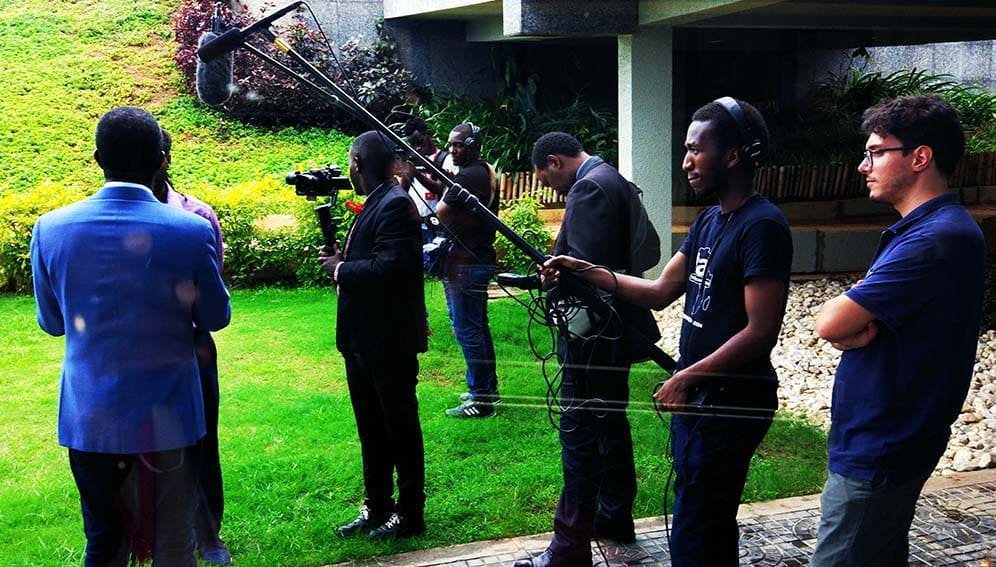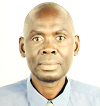
Image: Journalists interviewing a scientist at NEF Kigali
14/03/19
Script Practical Guide
How to report from lab visits and field trips
Speed read
- Your job is to provide accurate, unbiased, relevant, timely and interesting information
- Request the full itinerary before taking up the offer so you know what to expect.
- Be prepared with some story angles in advance to make the best use of the trip
By: Charles Wendo and Tan Shiow Chin
On this page:
Five benefits you get from lab and field visits
Getting a field trip
Remaining independent
Who sets the agenda?
Story angles
Questions to ask
Equipment to carry
On the day
Staying alert
Back home
Was your trip successful?
Five benefits you get from lab and field visits
- Immediate and straightforward stories
- Photos, videos and audio recordings for use in future stories
- Story ideas
- Contacts of scientists
- General scientific knowledge
Getting a field trip
- A scientific institution or their public relations agent may organise the trip and meet the cost, most often for a group of journalists. Usually they organise such trips to project a positive image of the organisation. Discuss with your editor whether it is okay to accept such a trip, and whether you should disclose in your story that it was funded.
- You could also negotiate that a research institution or a stakeholder organisation pays for your travel expenses. As in group trips, discuss ethical issues with your editor.
- Your media house might assign you to visit a research site or lab. In this case you need to get the necessary permissions and make appointments.
- You might organise your own visit if you can afford it, in which case you need to get the necessary permissions and make appointments. This is easier after you establish a name and scientists know you as a credidble science journalist.
Remaining independent
In any field of journalism funded trips remain a controversial issue. An organisation offering funded trips will have messages it wants you to take home. Their interest is to project a positive image of the institution. Your job is to provide your audiences with accurate, unbiased, relevant, timely and interesting information. Most often there is a middle ground – accurate information that is relevant and interesting to the reader while giving the researchers a good image. You need to maintain a friendly, measured, non-accusatory tone, and you can still ask questions that have to be asked to hold the organisation accountable.
If that is too difficult, you could wait until the end of the trip to ask the tough questions, or email them to the appropriate people after the visit. It’s courteous to give your hosts time to respond to difficult questions, and helps maintain a friendly and open atmosphere while you are with them, but it does risk receiving prepared — and therefore possibly more guarded — answers.
Who sets the agenda?
If you initiate a trip and meet your own costs, you will know the interviews and material you are after although there is no guarantee that your host will provide everything you ask for. But when an organisation or company organises the trip, they usually determine the itinerary and agenda. So request the full itinerary before you take up the offer. Know exactly what they intend to show you, and if possible, who will be available for interview.
Story angles
Trips like these are often filled with presentations, site visits, and/or interviews, leaving little time to pursue your own story. Without adequate preparation you end up following the organisers’ agenda entirely.
So be prepared with some story ideas. An Internet search will give the main researchers, their topics, and any obviously interesting angles. Search news archives so that you know what has already been reported about the institution and the theme of the visit. This will enable you to develop fresh story angles or follow up on interesting developments from previous stories.
Having your story idea and background information will help you prepare an initial list of questions, and ideas for photographs and/or videos. It helps ensure you don’t forget, or waste opportunities. If you are on a group trip but really want to develop a different story idea, or interview someone who isn’t on the itinerary, ask whether the organiser can make separate arrangements for you.
Even if you can’t do the extra interviews on the day, don’t consider the trip wasted. You will have made the necessary contacts to get the material.
Questions to ask
The basic thing is to ask questions about the subject of the visit. What have they done or what are they doing? Of what significance is it and what are the future implications? What problem are they solving and what is the manifestation of that problem in society?
Additionally, think about the following:
- What have the media reported recently about this topic? Therefore, what new questions can you ask the scientists to get fresh information to present to your audiences?
- Was there anything that the media reported about the institution sometime back that could have now progressed to a new level? If so, ask for the update so that you can do a good follow-up story.
- Might scientists at the host institution have an answer to a major concern in your society? This answer could be in form of an innovation, for instance energy-saving technology or knowledge, for instance how to manage excessive environmental temperatures. Ask the scientists.
- Has there been public controversy on this topic? Is the institution’s position on this controversy known? If no, ask for their position. If their position is already known, you could still ask them to defend it.
Equipment to carry
It’s essential to prepare your equipment. You may have prepared mentally, but even skilled short-handers might struggle without a working audio recorder, and broadcast journalists have no material if their equipment fails.
| Web | Radio | TV | ||
| Audio recorder | ✓ | ✓ | ✓ | |
| Camera | ✓ | ✓ | ||
| Notebook | ✓ | ✓ | ✓ | ✓ |
| Pen/Pencil | ✓ | ✓ | ✓ | ✓ |
| Video camera, microphones & light | ✓ | ✓ |
Here are a few other things to note:
- Consider taking back-up equipment if possible, particularly for longer trips. Some people take broadcast-quality equipment for formal material and use smartphones to gather material on the fly (such footage is increasingly acceptable to media outlets).
- Always take extra batteries and memory cards, and don’t forget your various chargers, particularly for overnight trips. For overseas trips, check that the voltage will suit your equipment, and remember your universal adaptor.
- Take note of the weather. Batteries run down faster in cold weather, while humidity, rain or sand might damage unprotected electronic equipment. And always ensure that you are properly equipped with clothes, backpacks etc.
- Are you fit enough? Some site visits might involve long walks and sometimes in difficult terraine, for example hilly places.
And finally, don’t forget plenty of business cards with your contact details on them, to give to the people you meet.
On the day
During the trip itself, be observant, keep your mind open and participate. Follow the principles of becoming a good science journalist and reporting on scientific findings.
A key advantage to interviewing someone in person is seeing their personality and expressions. You can pick up on areas they feel strongly about, and take your interview in new or unexpected directions.
Look around the office or laboratory, and note down any distinctive or interesting facilities, objects, layouts, pictures and writings. Good observation and description makes your story more interesting and informative. A good science story is not simply an assembly of plain scientific facts in simple language. But avoid detail that adds nothing to a story, for example in most cases it is not useful to describe a researcher’s height or complexion.
And, of course, try to get good photographs and video to add colour and interest to your story.
Research is rarely done by one person, so don’t just focus on the lead researcher. Ask to meet the other researchers in the team, ask what they do, and their areas of expertise. Try to get their cards and take note of their information on the back, to help you remember who does what. Equally importantly, when you give them your card, ask them to contact you about interesting future research. You may find that an interview, presentation, or even a casual chat, throws up new leads. So keep an open mind about how you might turn the material into a story.
Don’t be tempted to drop out of activities you think are not relevant. Ideas and contacts can come from unexpected sources, and you are also maintaining good relations with your hosts, whose help you might need for future articles.
Staying alert
Apart from listening, being observant is crucial here. While you’re on the lookout for colourful details and new avenues, remember that everyone always wants to show their best side to the media, but it might not always be accurate.
Try to look below the surface, and see the real situation. Have casual conversations with the people you meet and see what they think about their work and workplace. Analyse the statistics given to you and look carefully at any information to see if it might have been ‘massaged’ or manipulated to look better than it should.
But don’t purposely dig for dirt or scandals, or look to sensationalise your story. Simply ensure accuracy and make sure you’re not looking through rose-tinted glasses.
Back home
- Follow up with an email to any researchers who were particularly helpful during your visit — they may well turn out to be useful future contacts.
- Keep your notes. Even after writing the story you need to store your notes and recordings. You will almost certainly find them for adding context to other stories you might work on in future.
Was your trip successful?
- Taken contacts of scientists who you may call on for information, or who may alert you when new information emerges
- Created a collection of great photos and videos that you can use in future stories
- Produced a story that is both informative and interesting to your audiences
- Improved your knowledge of science.
In summary:
Tan Shiow Chin is a Malaysian health journalist with over 10 years’ experience of going out on field trips, whether to local hospitals, international research centres or rural communities.

